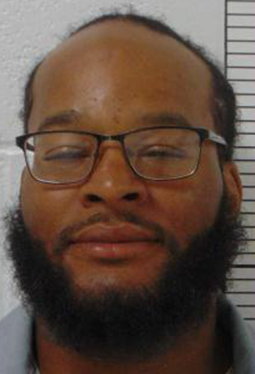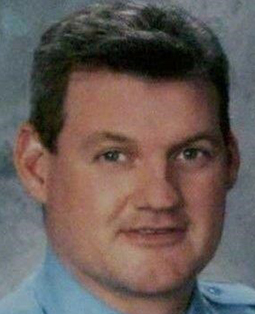The Missouri bishops have asked Gov. Mike Parson to grant clemency to Kevin Johnson, who is scheduled to be executed by the state on Nov. 29.
The Nov. 9 letter from the bishops, other religious leaders, and civic organizations asked the governor to reduce Johnson’s sentence to life in prison without parole. Johnson was convicted of first-degree murder for the 2005 killing of police Sgt. William McEntee in Kirkwood.
 Johnson“The death of police officer McEntee was a tragic waste of life. Our thoughts and prayers are with his family at this difficult time. Sadly, no punishment will restore him to his family,” the letter said. “Some may argue that society needs the death penalty to protect life. We strongly believe, however, that society can adequately protect human life without the taking of another human life.”
Johnson“The death of police officer McEntee was a tragic waste of life. Our thoughts and prayers are with his family at this difficult time. Sadly, no punishment will restore him to his family,” the letter said. “Some may argue that society needs the death penalty to protect life. We strongly believe, however, that society can adequately protect human life without the taking of another human life.”
The letter asks the governor to consider several factors, including the circumstances of the death of Johnson’s little brother, Joseph “Bam Bam” Long, the day Johnson killed Sgt. McEntee; his young age — 19 — when the crime was committed; his frontal lobe impairment brought on by head injuries; his mental health history of depression, suicidal thoughts and hearing voices; and the severe physical and sexual abuse and neglect Johnson experienced as a child.
Johnson’s first trial ended with a hung jury, whose members split 10-2 in favor of a lesser conviction. His second trial ended with the capital conviction.
Missouri has also set execution dates for Scott McLaughlin on Jan. 3 and Leonard Taylor on Feb. 7. All three were sentenced in St. Louis County.
“Beyond the aspect of this particular case, as civic and religious leaders, we are concerned that the use of the death penalty promotes revenge as a principle of justice to resolve social problems,” the bishops’ letter said.
A clemency application submitted by Johnson’s lawyers further details “the circumstances of his difficult upbringing and the emotional turmoil at the time of his wrongful action.”
“Despite the tragic nature of the crime he committed, Kevin Johnson deserves clemency because the shooting — and Kevin’s life — should be considered in its full context. Risk factors and adverse events feature prominently in Kevin’s development. Forensic psychiatrist Richard Dudley observed that Kevin’s entire childhood was defined by abuse and neglect,” the application said.
The application also notes that in August of this year, the American Psychological Association stated that based on the rationale that prohibits death sentences for juveniles, “the same prohibitions that have been applied to application of the death penalty for persons who commit a serious crime at ages 17 and younger should apply to persons aged 18 through 20…there is no neuroscientific bright line regarding brain development that indicates the brains of 18-to-20-year-olds differ in any substantive way from those of 17-year-olds.”
 Sgt. McEnteeThe American Bar Association in 2018 called for capital punishment to be banned for any offender who committed the crime at age 21 or younger.
Sgt. McEnteeThe American Bar Association in 2018 called for capital punishment to be banned for any offender who committed the crime at age 21 or younger.
Johnson’s remorse is expressed in both the clemency application and a clemency video that includes interviews with Johnson, his mother, brother and daughter, former teachers and friends.
“If I could speak to the McEntee family, his wife, his kids, I would tell them that I’m sorry. I never meant to tear their family apart. I never wished to bring pain to them. If I could erase that day, I would. I want to say I’m sorry,” Johnson said in the video.
“I’ve grown, and I’m a better person. I’m caring. I think I could be more of a help to people alive than dead,” Johnson said.
The inviolability and
dignity of every person
On Nov. 9, the Respect Life ministry at Christ the King Parish in University City hosted a viewing of “An American Tragedy: One Man’s Journey to Death, Another Man’s Journey to Forgive,” followed by a discussion on the Church’s response to the death penalty led by Mary Fox, director of the state public defenders office and parishioner at Christ the King.
“Historically, (the death penalty) came into action because there was no way to protect the community from the people who had committed crimes against the community. It was a safety measure,” Fox explained. “But the Church has changed over time, and Pope John Paul II…affirmed that modern society has the ability to protect itself in ways other than killing people.”
In 2018, the Vatican’s Congregation for the Doctrine of Faith added a new directive to the Catechism of the Catholic Church stating that capital punishment is inadmissible in all cases because it is an attack on the inviolability and dignity of the person.
Peter Engel, a parishioner at Assumption Parish in south St. Louis County, has volunteered in prison ministry at the Potosi Correctional Center for 30 years. He knew Jeffrey Ferguson, whose final days before execution are explored in “An American Tragedy,” and has seen firsthand how Ferguson and others have changed and grown into faith-filled people who serve as role models for others.
“The biggest thing for me is the restorative part. You can see how God’s mercy works in people’s lives. You see that conversion,” Engel said. “I see them trying to witness in their lives, witness to their faith in a tough situation, being incarcerated.”
After Ferguson’s 2014 execution for the murder of Kelli Hall, Kelli’s father, Jim Hall, forgave his daughter’s killer. When Fox thinks about the Church’s position on the death penalty, “Jeffrey Ferguson and Jim Hall speak to exactly what Pope Francis is saying: the death penalty is unacceptable because it’s an attack on the fact that we can all change, we can all grow, no matter how horrible the crime is, or how evil the person had been,” Fox said.
Working to abolish the death penalty “is as important of a respect life issue as the work that has been done to end abortion,” Fox said. “It’s something we need to focus on and that the state of Missouri, I think, is ripe to focus on.”
Church teaching on the death penalty (updated 2018)
Recourse to the death penalty on the part of legitimate authority, following a fair trial, was long considered an appropriate response to the gravity of certain crimes and an acceptable, albeit extreme, means of safeguarding the common good.
Today, however, there is an increasing awareness that the dignity of the person is not lost even after the commission of very serioius crimes. In addition, a new understanding has emerged of the significance of penal sanctions imposed by the state. Lastly, more effective systems of detention have been developed, which ensure the due protection of citizens but, at the same time, do not definitively deprive the guilty of the possibility of redemption.
Consequently, the Church teaches, in light of the Gospel, that “the death penalty is inadmissible because it is an attack on the inviolability and the dignity of the person,” and she works with determination for its abolition worldwide.
Catechism of the Catholic Church, 2267
What can I do to help end the death penalty in Missouri?
1. Pray. Both personal and communal liturgical prayer are sources of spiritual strength for living out the pro-life commitment to which the Gospel calls us. Our prayer is often a source of strength for others as well, particularly as we pray for those to be executed, their families, the victims and the victims’ families.
2. Sign clemency petitions for those facing imminent execution. Clemency petitions can be found on the Missourians for Alternatives to the Death Penalty website: madpmo.org/clemencycampaigns
3. Contact your state senator and representative and ask them to abolish the death penalty in Missouri. Find information about senators and representatives here: house.mo.gov/legislatorlookup.aspx
4. Support Missourians for Alternatives to the Death Penalty and the Catholic Mobilizing Network, the national Catholic effort to end the death penalty: madpmo.org and catholicsmobilizing.org.
5. Join the archdiocesan Office of Peace & Justice to participate in a prayer vigil outside the Eastern Reception Diagnostic and Correctional Center in Bonne Terre during an execution, including Kevin Johnson’s execution on Nov. 29. For more information, contact Marie Kenyon at (314) 792-7062 or [email protected].
>>The state of capital punishment
•Most recent execution in Missouri: Carmen Deck, May 3
•Prisoners on Missouri’s death row: 20
•Next scheduled executions: Kevin Johnson, Nov. 29; Scott McLaughlin, Jan. 3; Leonard Taylor, Feb. 7
•2022 executions across the U.S.: 13 people in five states: Missouri, Alabama, Arizona, Oklahoma and Texas. Four more were scheduled for Nov. 16 and 17, and one is scheduled for Dec. 15.
•U.S. states that have abolished the death penalty: 23 (plus the District of Columbia)
•States that have not abolished the death penalty but have not executed anyone in more than five years: 15
•States with governor-imposed moratoriums: 3 (California, Oregon and Pennsylvania)
•Most recent state to abolish the death penalty: Virginia (2021)
•Countries worldwide that have abolished the death penalty in law or practice: 144
•Most recent countries to abolish the death penalty: Papua New Guinea (2022), Sierra Leone and Kazakhstan (2021)
•How the U.S. compares: The 11 people put to death in the U.S. in 2021 placed the country ninth in the number of recorded executions, behind China, Iran, Egypt, Saudi Arabia, Syria, Somalia, Iraq and Yemen. The U.S. also likely executed fewer people than North Korea and Vietnam, whose executions are considered state secrets.
Information from the Death Penalty Information Center, deathpenaltyinfo.org.